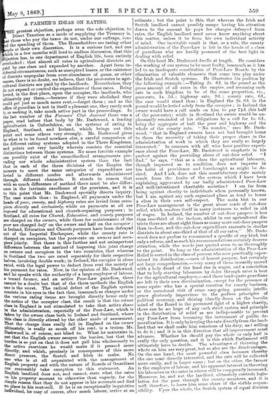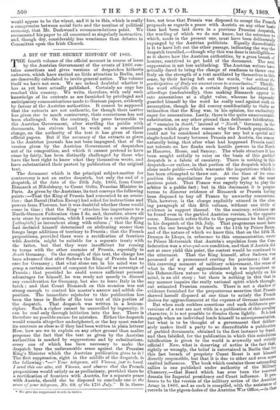A FARMER'S IDEAS ON RATING.
HE greatest objection, perhaps even the sole objection, to Direct Taxation as a mode of supplying the Treasury is, those who pay the taxes do not, under our suffrage, conthe spending of them. The Householders are taxing other ple at their own discretion. It is a curious fact, and one hich in a few months will lead to endless discussion, that this
• 'ection has, in one department of English life, been entirely overlooked ; that almost all rates in agricultural districts are paid by one class and expended by another. Apart from incidental circumstances, such as unexpired leases, or the existence of districts unpopular from over-abundance of game, or other causes, there is no doubt, we believe, that the poor-rates in agricultural districts are paid by the landlords. Nevertheless, they do not expend or control the expenditure of those rates. Being levied, in the first place, upon the occupier, the landlords, who Ultimately pay them,—because if they were abolished they could get just so much more rent,—forget them ; and as the officio of guardian is not in itself a pleasant one, they rarely seek it, or seeking it, take much active part in the proceedings. In the last number of the Farmers' Club Journal there was a paper, read before that body by Mr. Dashwood, a leading agriculturist in Oxfordshire, on the systems of rating in England, Scotland, and Ireland, which brings out this point and some others very strongly. Mr. Dashwood gives us what is to be found nowhere else, a careful comparison of the different rating systems adopted in the Three Kingdoms, and points out very lucidly wherein consists the essential distinctions between those systems. No more forcible example can possibly exist of the unmethodical arrangements pervading our whole administrative system than the fact that in each of the three divisions of the Empire the moneys to meet the same categories of expenditure are levied in different modes and afterwards administered through different channels. It stands to reason that with so much difference of method there must be also difference in the intrinsic excellence of the provision, and it is to this point that Mr. Dashwood specially directs inquiry. The case etands thus : in England, all payments under the heads of poor, county, and highway rates are levied from occupiers directly and exclusively, while no payments at all are imposed for educational and church-repairing purposes ; in Scotland, all rates for Church, Education, and county purposes are charged on the owners, while those for maintenance of the poor are charged half on the owner and half on the occupier ; in Ireland, Education and Church purposes have been defrayed out of the Imperial Exchequer, while the county rate is charged on occupiers, but the poor-rate on owners and occupiers jointly. But there is this further and not unimportant difference between the method of imposing this joint charge on owners and occupiers in the two countries, that whereas in Scotland the two are rated separately for their respective halves, involving double work; in Ireland, the occupier is alone rated, with the legal power to deduct from rent the moiety of his payment for rates. Now, in the opinion of Mr. Dashwood, and he speaks with the authority of a large employer of labour, a tenant farmer, and an active Poor-Law guardian, there cannot be a doubt but that of the three methods the English one is the worst. The radical defect of the English system consists in his eyes in the fact that, inasmuch as charges under the various rating items are brought directly home only to the notice of the occupier class, the result is that the owner class in England is not stimulated to take that active share in the administration, especially of the Poor-Law, which is taken by the owner class both in Ireland and Scotland, where this class is directly stirred by the other mode of assessment. That the charge does really fall in England on the owner Ultimately, is really so much off his rent, is a truism Mr. Dashwood is, of course, not blind to. What he maintains is, not that the English owner escapes the burden, but that the burden is so put on that it does not gall him wholesomely to the active exertions he would make if it pressed more directly, and which, precisely in consequence of this more direct pressure, the Scotch and Irish do make. No one who is at all acquainted with the management of English Property and with the nature of Boards of Guardians can reasonably take exception to this statement. An English landlord does not, and cannot, gate what the rates on his property amount to otherwise than vaguely, for the simple reason that they do not appear in his accounts and find DO place in his rent-roll. If he is an exceptionally inquisitive individual, he may of course, after much labour, arrive at an
estimate ; but the point is this, that whereas the Irish and Scotch landlord cannot possibly escape having his attention drawn to the amount he pays for charges defrayed from rates, the English landlord need never know anything about this matter, unless it be from his own individual activity of mind. One inevitable result is that, as a rule, the comity administration of the Poor-Law is left in the hands of a class of guardians who are hardly possessed of the best light in dealing with relief.
On this head Mr. Dashwood dwells at length. He considers the working of our system to be most faulty, inasmuch as it has led to an inadequate constitution of Poor-Law Boards by the elimination of valuable elements that come into play under the Irish and Scotch systems. Ho illustrates his position by the following example :—Taking 2s. 6d. in the pound as the gross amount of all rates in the empire, and assuming each rate in each kingdom to be of the same proportion, viz., poor-rate, is. 3d. ; highway rate, td. ; county rate (hi., the case would stand thus : in England the 2s. 6d. in the pound would be levied solely from the occupier ; in Ireland the owner would have a call made on him to pay Md. (his half of the poor-rate); while in Scotland the owner would be unpleasantly reminded of his obligations by a call for Is. 6d., being the aggregate of half the poor and highway and the whole of the county rate. "No wonder," says Mr. Dash, wood, "that in England owners have not had brought home to them the necessity of taking their proper share in the administration of work in which they are really so largely interested." In common with all who have positive experience about the Poor-Law, Mr. Dashwood is emphatic in his protest against the prevailing abuse of out-door relief. "I find," he says, "that as a class the agricultural labourer, though improved as to condition, does not improte in his habit of providence and forethought as might be desired. And I ask, does not this unsatisfactory state mainly result from the faults of the system which I have been explaining, aggravated by our badly administered Poor-Law and well-intentioned charitable societies it I am far from being against charity to individuals when personally known, but I am against any such organized plans as tend to lower a class in their own self-respect. The main blot in our Poor-Law management is the groat abuse made of out-door relief, which resolves itself in many instances to relief in aid of wages. In Ireland, the number of out-door paupers is less than one-third of the in-door, whilst in our agricultural die. tricts there are about eight times as many more out-door paupers than in-door, and the out-door expenditure amounts in similar districts to about one-third of that of all our rates." Mr. Dash. wood does not profess to recommend a specific of any kind, but only a reform, and as such his recommendations certainly deserve attention, while the words just quoted seem to us thoroughly to the point. So long as the administration of the Poor-Law Relief is vested in the class of persons who now practically superintend its distribution,—men of honest purpose, but certainly not large comprehension,—very many of them inwardly moved with a holy dread of the least rise in wages, and a conviction that to help starving labourers by doles through rates is best for the agricultural employer,—and these inadequate guardians are left to their own discrimination, except for the presence of some squire who has a special vocation for county business, or the occasional visit of some easy-going, parsonic intelli. gence gloriously impervious to the godless principles of political economy, and shining blandly down on the bucolic mind of the Board in the presumed light of a higher charity, there can be nn hope of any such strict system and principle in the distribution of relief as are indispensable to prevent any Poor-Law from becoming the instrument of public de,
moralization. It is only by levying the rate directly from the land. lord that we shall make him conscious of his duty', an-1 willing to do it ; and it is in this direction that all improvement nit*
advance. Whether he should pay the whole or only half .ie really the only question, and it is this which Parliament will ultimately have to decide. The advantages of throwing the whole on him are very great, but so also are the disadvantages. On the one hand, the most powerful class become* thereby the one most directly interested, and the rate will be collected more easily, and in larger sums ; but on the other, the farmer is the employer of labour, and his apparent interest in throwing
his labourers on the rates in winter will be very greatly increased. Moreover, he and not the landlord, ultimately controls legislation for the poor through the county members, and it is well, therefore, to leave him some share of the visible responsibility. Upon the whole, the Scotch system of equal division
would appear to be the wisest, and it is to this, which is really a compromise between social facts and the maxims of political economy, that Mr. Dashwood's recommendations point. We recommend his paper to all concerned as singularly instructive, and, though dry, considerably less wearisome than debates in Committee upon the Irish Church.































 Previous page
Previous page